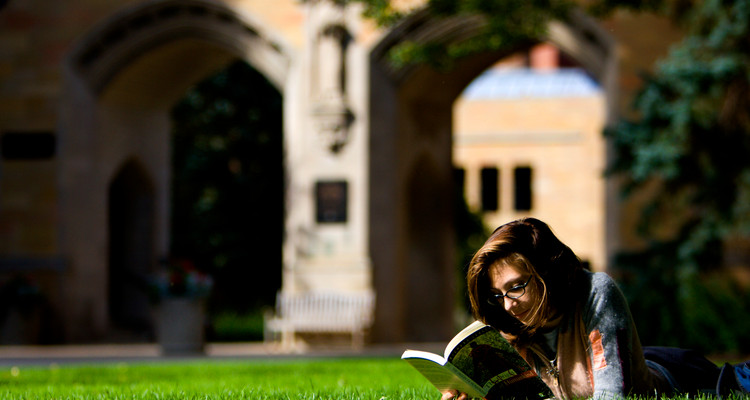Join libraries and readers across the United States by celebrating Banned Books Week from Sept. 27-Oct. 3. The St. Thomas Libraries have an online guide to navigating the world of challenged books, including information on which books are the most challenged, why and by whom; a space to converse about challenged or banned books; and a trivia contest. Displays also are up in O’Shaughnessy-Frey Library and Charles J. Keffer Library.
Banned Books Week, which celebrates the freedom to read, was first started in 1982.
Andrea Koeppe, the research and instruction librarian who has helped with Banned Books Week for more than 10 years at St. Thomas, said a huge part of the week is just reminding people that attempts to ban books still happen today.
“People think about these things as happening in the past,” Koeppe said. “They think about Ulysses. … (They) sort of equate, ‘Oh, but that was such a long time ago! It’s 2015. It doesn’t happen now.’ Yes, it does.”
According to the St. Thomas Libraries’ guide on challenged and banned books, 35 percent of books are challenged by parents, and the most common reasons are: unsuited for a certain age group, sexually explicit material, offensive language, and religious viewpoint. Racism, sexism and homosexuality are reasons listed as well.
“I understand that what parents – individual parents – chose for their family (is) definitely well within their right,” Koeppe said. “When people try to take that a step further and try to tell me and my family, or anybody’s family, what to do, it’s a really ugly undercurrent.”
Typically, a book is challenged in an effort to have it removed from a library and limit access to it. Because these books often cover material that can be considered controversial, Koeppe said it’s important to keep them around because they may help spur vital conversations about those hard-to-talk-about issues.
“Have those conversations,” Koeppe said. “Go out of your way to have those conversations. Go out of your way to find out what these books are about. … If a conversation is difficult to have, then maybe it’s one worth having.”
Check out some of St. Thomas staff and faculty member’s favorite challenged books:
Andrea Koeppe: Judy Blume's books, particularly Are You There, God? It's Me, Margaret. "I grew up reading a lot of those. ... I was exactly at that age. I could so have so easily been that person where a librarian or some school teacher said, 'No, this is not appropriate for you. I don't want you to read this.'"
Shannon Scott, adjunct professor of English: Lady Chatterly's Lover D.H. Lawrence. "I remember when I first read this novel as an undergraduate, I didn't expect much in terms of scandalous sexuality – it seemed like I would witness more 'pornographic' material simply by turning on network TV. And yet I was surprised by the frank, tender and gently humorous love-making scenes that occur between Connie and Mellors. ... It was scandalous in way that forced me to reconsider the depth of human relations."
Lisa Guyott, director of marketing and communication at the Opus College of Business: Catcher in the Rye by J.D. Salinger. "I’m likely only one of several thousand teenagers who spent at least a year carrying Catcher in the Rye around in her backpack, wondering how the brilliance of Holden Caulfield could possibly be overlooked by his friends, teachers and family. In turns offering both confidence, bravado and despair, the book captures the essence of youth, the tightrope walk between knowing it all and knowing absolutely nothing. Holden is lonely, but shuns groups; he wants to be an adult, but is too naïve to understand the complexities of adulthood (seeing adults, of course, as 'phonies.'); he wants to be seen as unique, but craves acceptance. It captures, as though written by a 16-year-old, the tentative foray into adulthood and the quick retreat that follows, leaving the reader with the overwhelming need to whisper, 'Yes, yes, exactly, that’s it.'"
Liz Wilkinson, associate professor of English: The Absolutely True Diary of a Part-Time Indian by Sherman Alexie. "Alexie is a great and beautifully controversial voice in Native literature specifically and in American literature, today. In The Absolutely True Diary... he creates the complicated world of a Native American teenager, who chooses to leave his reservation school for the education he can receive at the white high school off reservation. While the focus is on Arnold (aka Junior), the narrator and main character of the novel, the supporting characters provide a complex glimpse into a world few know. While it is fiction, Alexie has talked about how much of it has been drawn from his own experiences."
Kate Norlander, associate director of communication services: The Harry Potter series. "It’s hard for me to pick my favorite banned book, but the Harry Potter series is high on my list. (Note that I picked a series of seven books.) J.K. Rowling’s books came out when I was an adult, but they enchant me every bit as much as they would have if I had encountered them as a child. Rowling is one of those people who can craft a world you wish you could live in. There’s no doubt in my mind that children – and adults – will still be reading these books in 2047, 50 years after the first book was published. "







